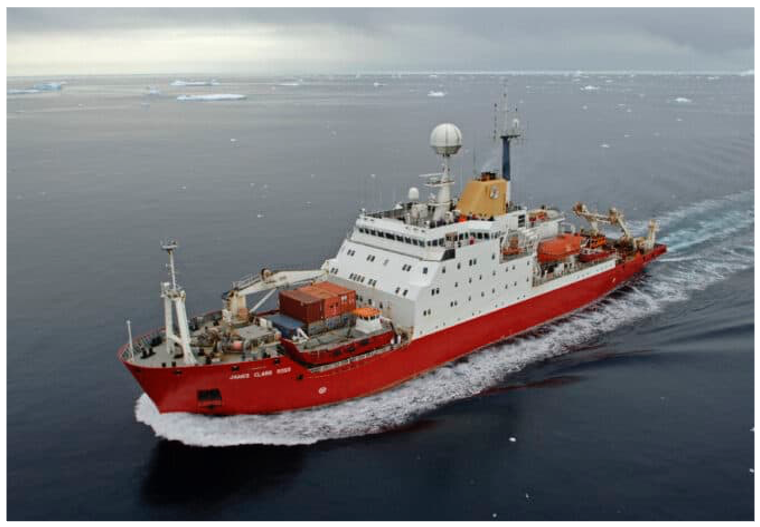Noosfera, UA

Noosfera, UA
The vessel is a polar supply and research ship operated by the National Antarctic Scientific Center of Ukraine. Until 2021, she was operated by the British Antarctic Survey and named RRS James Clark Ross.
Contact
Operator contact: uac[at]uac.gov.ua
Logistic evaluation contact: fleet_opt[at]winot-ou.com
Location
Cape Town, South Africa
Website
http://uac.gov.ua/en/icebreaker-noosphere-en/
Facilities
The vessel is equipped with a suite of laboratories and winch systems that enable studying the seabed at a depth of 8 km. In addition to a crew of 27 people, NOOSPHERE can accommodate up to 50 scientists. The vessel’s autonomy of up to 2 months allows research in any point of the World Ocean. It conducts research not only in Antarctica but also in the Arctic and other regions of the planet.
Multipurpose ice-class vessel designed to perform a wide range of polar logistics, research and life support tasks.
Staff Capacity: 26 crew members + 45 passengers (scientists)
Noosphere team works closely with expedition leaders to develop detailed logistical plans tailored to the specific requirements of each research project. They assist in the procurement and transportation of specialized equipment and supplies needed for the expedition, coordinating with suppliers and logistics partners to ensure timely delivery to the Antarctic region.
NASC operates research stations equipped with modern facilities to accommodate scientists and support staff during their stay in Antarctica.
Accommodation options range from dormitory-style quarters to individual cabins, depending on the expedition needs.
Facilities include laboratories, dining areas, communication centers, and recreational spaces to meet the diverse needs of researchers working in remote and challenging conditions.
NASC offers technical support and expertise to help researchers set up experiments, deploy scientific instruments, and collect data in the field.
NASC maintains an inventory of research equipment available for rent, including sensors, sampling devices, and analytical instruments, to facilitate a wide range of scientific investigations.
Technical staff are available to provide training and assistance with equipment operation, maintenance, and troubleshooting throughout the duration of the expedition.
NASC ensures reliable communication links between research stations and external collaborators, supporting data transfer, video conferencing, and internet access for remote research teams.
NASC provides data management services to help researchers organize, store, and analyze their scientific data, adhering to best practices for data security, integrity, and accessibility.
NASC prioritizes the safety and well-being of all users, providing comprehensive safety briefings, emergency protocols, and medical support services.
NASC staff is trained in first aid, wilderness medicine, and search and rescue techniques to respond effectively to emergencies in the field.
They maintain communication with external emergency services and evacuation resources to ensure prompt assistance in the event of a medical or logistical crisis. NASC promotes environmental stewardship and sustainability practices in all aspects of expedition planning and operations.
NASC adheres to strict environmental guidelines to minimize their ecological footprint and protect fragile Antarctic ecosystems from anthropogenic impacts.
Services offered
Geological (granulometric, mineral, chemical, and micropaleontological composition of the bottom sediments), geospatial (fixation of powerful lightings) and oceanographic (testing the models of marine waves) not only in the Atlantic sector of Antarctica but also along the whole route of the vessel.
Unit of access:
RI/day
What is included in the Access
Organisation of the cruise and preparation of equipment, all services on board. The typical duration of work is about 28 days. Users will be integrated into the scheduling of the infrastructure and, after coordination with the captain, can use the infrastructure independently.
Availability for Access
See the table in the dedicated Transnational Access call page.
Operational area
Cape Town – Ushuaia – Vernadskiy station
Time frame for access preparation
Documentation from RI users is typically received within a designated timeframe (usually 14 days) after access is granted, ensuring that all necessary preparations can be made in advance of the expedition. Logistic arrangements to access the RI are also coordinated within specific timeframes to streamline operations and optimize resource allocation.
Permits, licenses and training
Access to our RI requires permits and licenses issued by relevant national authorities, including environmental regulatory responsible to the obligation within Antarctic treaty. These permits ensure compliance with legal and environmental obligations and are obtained through a collaborative effort between our center and the expedition team.
RI users are required to undergo specialized training and certification to enhance safety and mitigate risks associated with Antarctic fieldwork. Training programs cover essential topics such as field survival skills, environmental stewardship, and emergency response protocols, ensuring that users are well-prepared for the challenges of conducting research in this remote and extreme environment.
Medical guidelines
RI users are required to provide detailed personal information, including medical history, allergies, and food intolerances, to ensure that appropriate accommodations and provisions can be made for their well-being. Medical examinations and health checks may also be required to assess users’ fitness for Antarctic travel and mitigate health risks associated with the expedition.